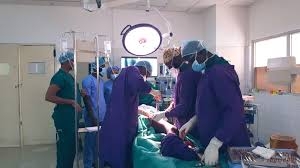Select a category
Advertisement

Surgery Rotations In The Gambia; My Opinions And High Yield Topics Covered During Rotation.
5 years ago
Advertisement
Surgery rotations at the EFTSH, Banjul, The Gambia was really interesting and impactful. Everyone was friendly and patient, a prerequisite for a successful rotation.
A Brief Opinion based on my experience.
The rotations were standard when you want to compare to similar rotations in countries like Nigeria, The Caribbean’s, etcetera (I was able to do some comparison with some friends in these countries).
The Consultants are really kind and understanding, they would try to teach you as much as you need to know.
It is very important that you study before you start your surgery rotations because your superiors (Consultants, Registrars, Medical officers and House officers) would expect that you already know a lot from Basic sciences and previous rotations.
They are going to ask you a lot of questions, don’t run away. Be bold, give answers to questions you know, attempt the ones who have an idea of and politely excuse yourself for those you have no knowledge.
Some of the consultants took note of their students, they noticed how much questions you answer during the rounds, they also notice your punctuality and probably many other salient characters I can’t point at now. That way they have a mental picture before the examination. The point is, you may earn your marks even before the examination day, so study before your rounds at least.
Clerking of patients, cannot be over emphasized.
Advertisement
Time management is really important in clerking, if you know the local languages (Wollof, Mandika, Fula etcetera) you are in luck.
Surgery rotation's most common/High yield topics.
I have compiled a list of the most popular/high yield topics that was encountered during our rotations, most would be tested during ward rounds, out patients and surgical procedures and others would be tested during the examination.
The list below may not be complete, but if you are able to cover most, I will bet on you for the student surgery examination whether it be in The Gambia, West Africa or The Caribbean’s (These I have knowledge of).
I will prepare notes on most of these topics and place the links here. Guide yourself with these topics and always check back to see if I have updated the links to my notes here. These notes would be of great help to you, especially in forming the base for your studies.
This list is in no particular order.
Advertisement
1. Pre-operative (Before surgery/operation) and Post-operative (after surgery/operation) management
2. General Physical Exam
3. Factors affecting wound healing
4. Wound classification
5. Process of wound healing
6. Factors affecting wound healing
7. Appendicitis
9. Classification of Diabetic foot
10. Ulcers
11. Description of Ulcers
12. Types of Amputations
13. Indications for Amputation
14. Complications of Amputation
15. Jaundice
16. Anatomy of the foot
17. Deep Venous Thrombosis (DVT)
18. Pulmonary Embolism and Virchows triad
19. Intestinal Obstruction
20. Complications of Intestinal Obstruction and their Treatment
21. Pneumothorax
22. Classification of pneumothorax
23. Curvesoirs sign
24. Peritonitis
25. GI bleeding
26. Hernia (Really high yield)
27. Urine output
28. Hirschprung disease
29. Peptic Ulcer Disease – types and complications
30. Cholecystitis
31. Pancreatitis
32. Gastric Outlet Obstruction (Inability of Gastric content to go beyond proximal duodenum)
33. Upper Motor Neurons and Lower Motor Neuron lesions (for the neurosurgeon)
34. Factors that impair/prevents Wound healing
35. Surgical site infection
36. Charcot Triad and Reynolds Pentad
37. Necrotizing fasciitis (Deep Spreading infection affecting the fascia planes)
38. Acute Abdomen
39. Gangrene (A type of Necrosis of body tissue. Types: Dry, Wet, Gas, Founier)
40. Septic foot
41. Spinal Injury (Motor deficits, Abnormal/Decreased sensations)
42. Cellulitis
43. Colon cancer
44. Transfusions (Whole blood, PRBCs, FFP, Cryoprecipitate, Platenlets)
45. Diabetes
46. The Diaphragm (Supply and anatomic relations)
Viva Examination focus
1. Resuscitation equipment
2. X-Ray (Chest, Head)
3. CT scan
4. Cannula
5. Catheter
6. Fluids & Crystalloids (Composition & Uses)
7. NG tube
8. Endotracheal tube
9. Surgical Instruments
Short case Examination focus
1. Neck swelling
2. Hernia/Groin mass
3. Breast mass
4. Hirschsprung disease
Neurology focus
I will suggest you pay attention to these topics for neurology.
I remember the neurosurgeon liked these topics. He even openly said he would not forgive anyone who fails to answer questions on the Glasgow Coma Scale.
1. American Spinal Injury Association (ASIA) classification of spinal injury
2. Dermatomes
3. Types of spinal cord injury
4. History and Physical Examination of the Neurologic system
5. Glasgow Coma Scale (GCS)
6. Hydrocephalus
7. Spina bifida and anencephaly
Please note:
This list covers only Surgery 1 rotations.
.Disclaimer If this post is your copyrighted property, please message this user or email us your request at [email protected] with a link to this post
Advertisement
 Peter
Peter